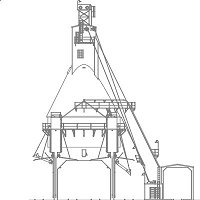
STEAM OPERATIONS
OF THE
CHESAPEAKE &OHIO RAILWAY
AT
HINTON
by
William E. Simonton, III
ORAL HISTORY
|
Home |
Steam Operations |
Drawings |
Typical Heavyweight Passenger Car Consists
1940's |
Contact |
|
Numbered Structures |
A.F.E. Map Revisions |
Articles |
Notes
|
Things to Come |
What's New | Photos
|
Author's Note: I do not know if all of the following are embellished memories of real events, or factually correct recollection of events, but whatever their source, they offer a glimpse into a past that is forever closed to those who were not a part of it.
Charles Hannah related the following anecdotes based upon his experience at the coal dock..
On one occasion a steam engine fouled the
chain which operated the undercut lever jamming it in the open position. The
coal dock rapidly began emptying. The pit foreman climbed out onto the top of
the coaling gate, and was able to kick it free, but barely missed being struck
in the head by the counter-weights as the coaling chute came back up. (Note:
Caused by a 2700 class engine number unknown.)
On another occasion the bell of C & O 301, a Hudson passenger engine destined for No. 1, The George Washington, the C & O's premier passenger train, caught the under cut lever chain which opened the coaling gate. Coal cascaded upon the front end of the locomotive filling the stack and smokebox. The road engine foreman ordered everyone to back off and opened the throttle wide. The engine drivers spun in place, and the coal was blasted from the stack. As the smokebox was still filled with coal it was then necessary to take the engine to the roundhouse, drop the fire, and shovel the coal from the still-hot smokebox out the smokebox door. Everyone took a hand as the time one could spend shoveling out the smokebox was just long enough to throw out a few shovels full. While this work was going on, the laborer directed to prepare the engine for re-firing, triggered the igniter - a wad of kerosene soaked rags and turned on the blower, and the hostler in the smokebox hearing the igniter and blower flew out the smokebox door. The words directed to the laborer in the cab were not gentle. Amazingly, the engine was ready when needed for The George Washington, and no delay, which would have required a written report, was caused.
During the course of one discussion with Charles Hannah and Sims Wicker while standing on the steps of Sims home, they told me of an occasion when clinker (slag left after poor quality coal is burned) had built up in the firebox of an H-8 2-6-6-6 to the extent that it could not be dislodged despite the best efforts of the fireman using the grate shakers and stoker bar. The fire was dropped and a laborer sent into the firebox to breakup the clinker. They made it clear that this was done right after the fire was dropped. I listened and took it all in only offering encouraging comments to keep them talking and did not question their story. Only afterward during discussions with other individuals did it become clear that it would have taken hours for the firebox to have cooled sufficiently for a laborer to enter, and it was also highly doubtful that a stocker bar would have been unable to break up the clinker. I wish now I had asked more questions.
Jim EuDaly
Want to run some extra passenger trains on New River? In July or August of 1954 Ruth and I rode #104 from Montgomery to Hinton and returned on #13. Number 104 was deadheading 2 or 3 coaches to Hinton to be used on a baseball special from Hinton to Cincinnati. Such special moves were fairly common in that era. Deadhead equipment to Hinton on a regular train, run a special train round trip to Cincinnati and return, then deadhead the equipment west to Huntington or Ashland.
Roy Long
Three articles prepared by
Roy Long describing Freight Operations at Hinton, the operation of fast
freight No. 90 "The Expediter" which passed through Hinton, and Mr.
Long's memories of the coal dock are also posted on this website.
FREIGHT OPERATIONS AT HINTON,
by Roy Long.
C&O TRAIN NO. 90, 'THE
EXPEDITER', by Roy Long.
A NEW COAL BIN FOR HINTON. Hinton Daily News
September 21, 1993, by Roy Long.
Copyright
2004 - 2008 William E. Simonton, III